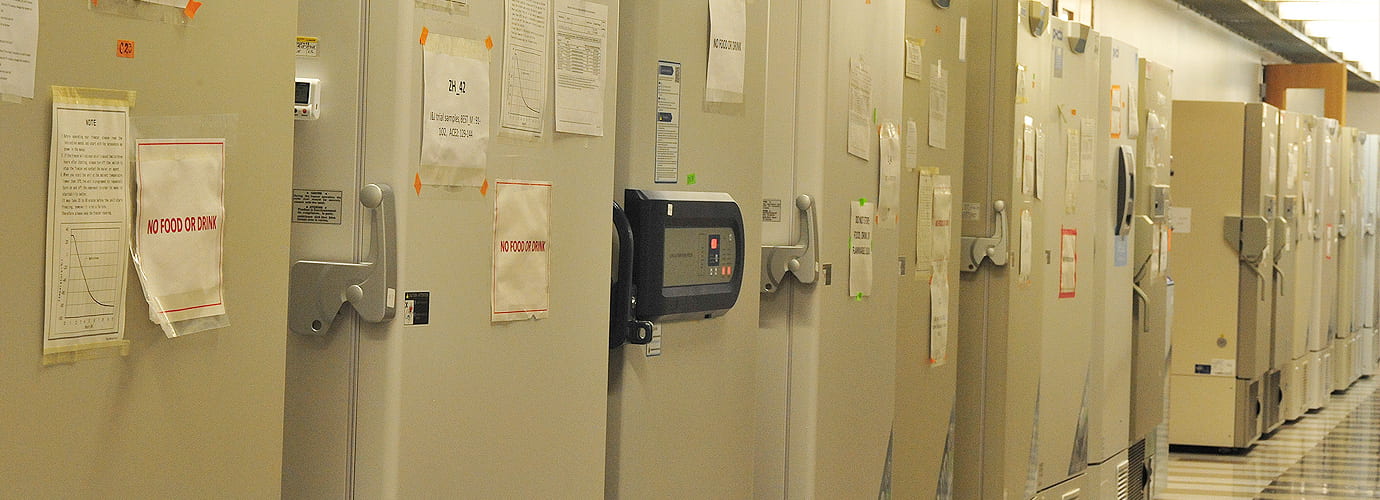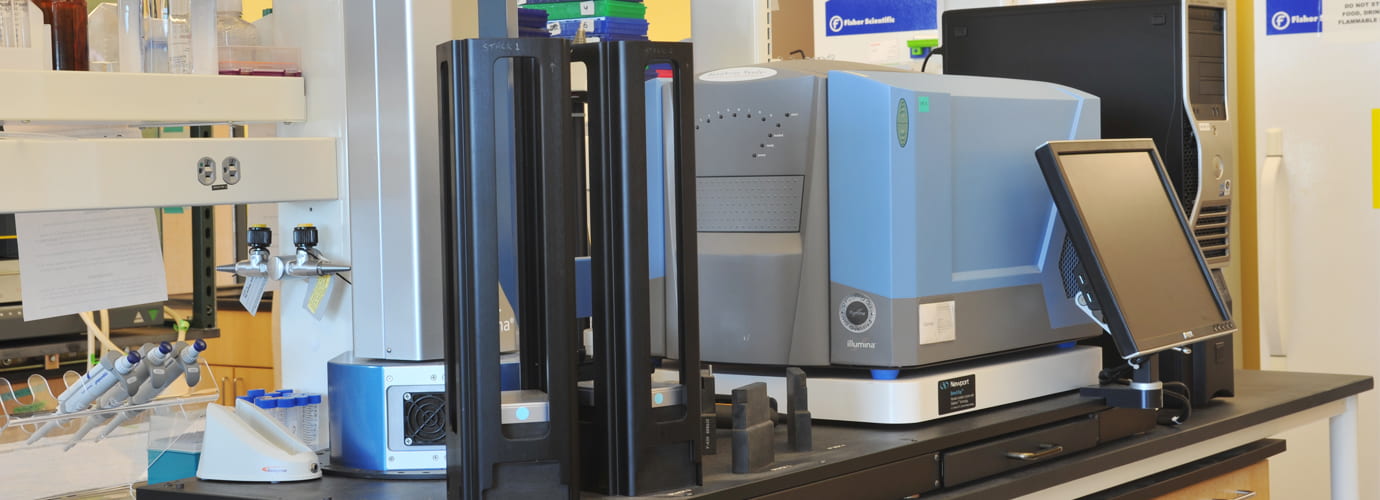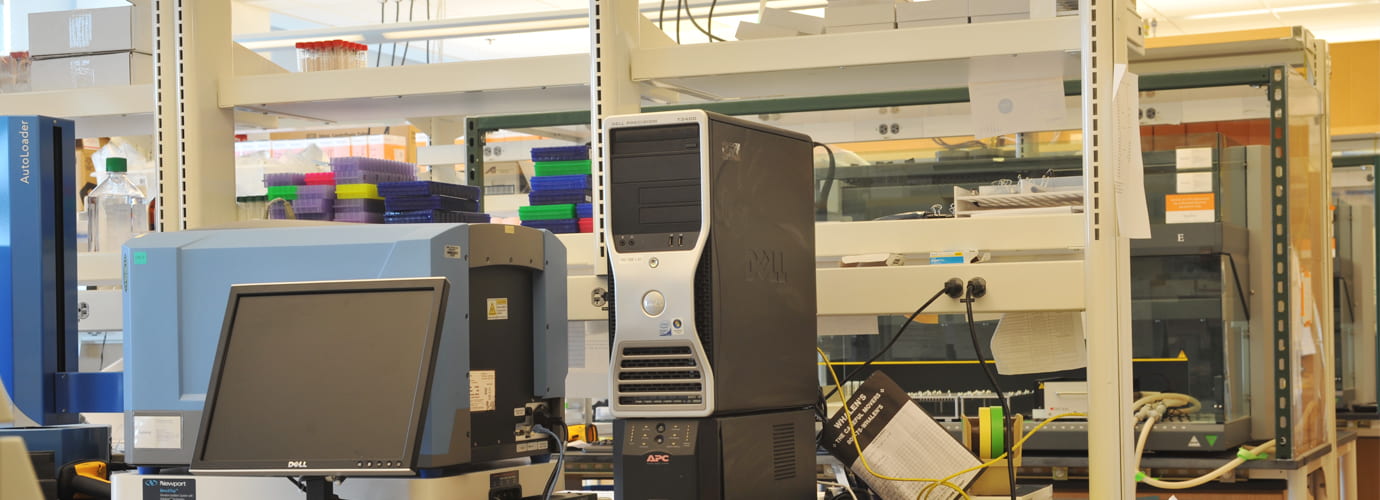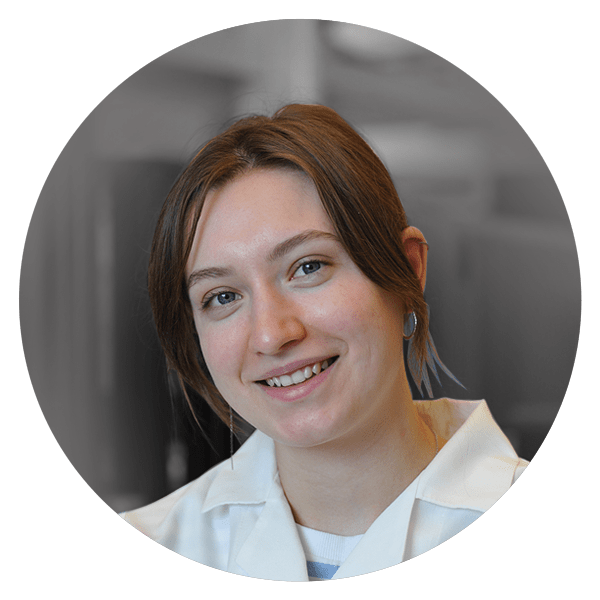Our expert research team performs a range of studies related to molecular genomics and proteomics.
Our expert research team performs a range of studies related to molecular genomics and proteomics.
With an extensive, high-quality, bio-bank of research specimens and up-to-date technology and equipment, our lab is well-suited for large-scale population health studies.
Located on the University of Chicago campus in the city’s Hyde Park neighborhood, its capacity includes 2,646 square feet of core laboratory space, 385 square feet of sample repository and other storage space, and 780 square feet of office space.
PROCESSING AND ASSAYS
SELECT A CATEGORY BELOW:
Initial sample processing:
Includes separation of plasma/serum, cell separation including peripheral blood mononuclear cells (PBMC) and granulocytes, and aliquot creation.
DNA and RNA extraction: High throughput extraction from different sources including whole blood, blood cells (PBMC, granulocytes), cf-DNA, tumor and normal tissue from fresh frozen and formalin-fixed paraffin-embedded (FFPE) blocks, saliva, and stool.
DNA and RNA extraction:
High throughput extraction from different sources including whole blood, blood cells (PBMC, granulocytes), cf-DNA, tumor and normal tissue from fresh frozen and formalin-fixed paraffin-embedded (FFPE) blocks, saliva, and stool.
DNA-based assays:
The lab has experience with generating genome-wide SNP genotyping using different array platforms for multiple genome-wide association studies (GWAS) from more than 20,000 samples.
Read some of our GWAS studies:
A genome-wide association study of early-onset breast cancer identifies PFKM as a novel breast cancer gene and supports a common genetic spectrum for breast cancer at any age – PubMed (nih.gov)
High-throughput genotyping:
The lab has experience with generating genome-wide SNP genotyping using different array platforms for multiple genome-wide association studies (GWAS) from more than 20,000 samples.
Read some of our GWAS studies:
A genome-wide association study of early-onset breast cancer identifies PFKM as a novel breast cancer gene and supports a common genetic spectrum for breast cancer at any age – PubMed (nih.gov)
Genome-wide methylation:
We have carried out several genome-wide methylation studies using thousands of samples from different human tissues.
Read some of the studies:
A genome-wide DNA methylation study in colorectal carcinoma – PubMed (nih.gov)
Next Generation Sequencing (NGS):
We have performed targeted DNA sequencing from six thousand samples.
Read one of our NGS studies:
Sequencing-based fine-mapping and in silico functional characterization of the 10q24.32 arsenic metabolism efficiency locus across multiple arsenic-exposed populations – PubMed (nih.gov)
RNA-based assays:
Candidate-based gene expression study using qPCR, genome-wide gene expression using microarray platform, and targeted gene expression on NGS using MiSeq and transcriptome-wide sequencing on HiSeq.
Read some of our studies:
A Transcriptome and Methylome Study Comparing Tissues of Early and Late Onset Colorectal Carcinoma – PubMed (nih.gov)
Protein-based assays:
Simultaneous detection of multiple analytes like cytokines, auto-antibodies, and cardiac and metabolic biomarkers in body fluids using multiplex Luminex platforms.
Read studies from the lab using this method:
Association between arsenic exposure from drinking water and plasma levels of cardiovascular markers – PubMed (nih.gov)
Telomere assay:
Our lab has developed a novel cost-effective high-throughput assay for Relative Telomere Length (RTL) measurement from DNA using a probe-based Luminex assay that does not need DNA amplification by PCR. The assay has been used in a number of large-scale epidemiological studies, including HEALS and GTEx, to determine RTL in more than ten thousand samples.
Read some of our studies using this method:
A novel pooled-sample multiplex Luminex assay for high-throughput measurement of relative telomere length – PubMed (nih.gov)
Determinants of telomere length across human tissues – PubMed (nih.gov)
BIO-BANK

Recognizing the critical importance of high-quality, well-annotated biospecimens for medical research health and disease, the lab has established a standardized, regulatory-compliant, and genetic privacy-protected repository for fluid and tissue biospecimens. This enables us and our partners to reduce costs, redundancies, and risks.
The bio-bank currently holds more than 1 million samples from around the world. They are stored in our repository in 29 freezers at -86 degrees Celsius and 29 freezers at -20 degrees Celsius, with continuous wireless monitoring, an active notification system, and an emergency generator backup to ensure their integrity and quality.
All are bar coded in compliance with required regulations and genetic privacy protection, and access is restricted to authorized personnel. Our custom-built electronic sample management system enables tracking and inventory management, specimen annotation, and flexible query and data reporting.
LAB EQUIPMENT

On-site lab equipment includes:
- Six refrigerated and six non-refrigerated centrifuges
- Five thermocyclers
- Real-time qPCR machine (Bio-Rad)
- Agilent Bioanalyzer
- NanoDrop 1000
- NanoDrop 8000
- Quantus fluorometer
- Barcode printers
- Illumina scanner with auto-loader
- Two Tecan Evo robots for automated liquid handling
- Hybridization ovens
- NGS MiSeq instruments
- Luminex 200 platform
- The laboratory also has access to an Applied
- Biosystems 7900HT real-time PCR system, Sanger sequencing, iScan, HiSeq, and NovaSeq in the same building.
COMPUTING EQUIPMENT AND NETWORK

The laboratory is equipped with 13 personal computers, network printers, and barcode printers. A file server is connected to multiple disk storage arrays capable of processing a massive amount of microarray data.
An efficient local area network has been established to connect the MiSeq sequencer, bead array readers, BeadXpress reader, autoloader, Tecan robots, and barcode-scanning PCs.
Muhammad G Kibriya, MD, PhD
Research Associate Professor
Department of Public Health Sciences
Institute for Population & Precision Health
Under the direction of Dr. Muhammad Kibriya, lab scientists carry out genome-wide DNA- and RNA-based molecular genomic assays and highly multiplexed biomarker assays such as auto-antibody, inflammatory cytokines, other cardiovascular markers, and a novel high-throughput telomere length assay suitable for large-scale population health studies. The lab also offers large-scale bio-banking of different types of biological samples.
Farzana Jasmine, MD, PhD
Staff Scientist
Institute for Population & Precision Health
Expert in molecular genomic assays including microarray-based genome-wide high throughput SNP genotyping assays, transcriptome wide gene expression, DNA methylation assays, Illumina next generation sequencing (NGS) for target DNA, RNA, whole exome, whole genome sequencing, bisulfite sequencing for whole methylome, whole genome and targeted methylome.
Muhammad G Kibriya, MD, PhD
Research Associate Professor
Department of Public Health Sciences
Institute for Population & Precision Health
Under the direction of Dr. Muhammad Kibriya, lab scientists carry out genome-wide DNA- and RNA-based molecular genomic assays and highly multiplexed biomarker assays such as auto-antibody, inflammatory cytokines, other cardiovascular markers, and a novel high-throughput telomere length assay suitable for large-scale population health studies. The lab also offers large-scale bio-banking of different types of biological samples.
Farzana Jasmine, MD, PhD
Staff Scientist
Institute for Population & Precision Health
Expert in molecular genomic assays including microarray-based genome-wide high throughput SNP genotyping assays, transcriptome wide gene expression, DNA methylation assays, Illumina next generation sequencing (NGS) for target DNA, RNA, whole exome, whole genome sequencing, bisulfite sequencing for whole methylome, whole genome and targeted methylome.
MEET THE IPPH TEAM
Afzal Shaikh
Research Specialist II

Yuliia Khamkevych
Laboratory Research Analyst

Thejashree Sarapalle
Laboratory Research Analyst

